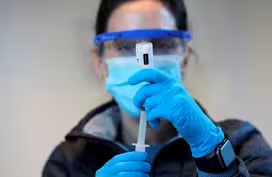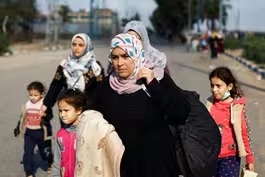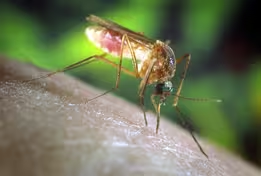
Ukraine’s humanitarian crisis worsens as U.S. funding stalls
Clip: 11/18/2023 | 5m 19sVideo has Closed Captions
Humanitarian crisis in Ukraine worsens as U.S. funding stalls
President Biden has asked Congress for tens of billions of dollars to support Ukraine in its war against Russia. Most of it would be for military aid, but it also includes money to address the nation’s worsening humanitarian situation. Zoe Daniels with the International Rescue Committee joins Ali Rogin to discuss the effects of the war on Ukraine’s civilians, particularly millions of children.
Problems playing video? | Closed Captioning Feedback
Problems playing video? | Closed Captioning Feedback
Major corporate funding for the PBS News Hour is provided by BDO, BNSF, Consumer Cellular, American Cruise Lines, and Raymond James. Funding for the PBS NewsHour Weekend is provided by...

Ukraine’s humanitarian crisis worsens as U.S. funding stalls
Clip: 11/18/2023 | 5m 19sVideo has Closed Captions
President Biden has asked Congress for tens of billions of dollars to support Ukraine in its war against Russia. Most of it would be for military aid, but it also includes money to address the nation’s worsening humanitarian situation. Zoe Daniels with the International Rescue Committee joins Ali Rogin to discuss the effects of the war on Ukraine’s civilians, particularly millions of children.
Problems playing video? | Closed Captioning Feedback
How to Watch PBS News Hour
PBS News Hour is available to stream on pbs.org and the free PBS App, available on iPhone, Apple TV, Android TV, Android smartphones, Amazon Fire TV, Amazon Fire Tablet, Roku, Samsung Smart TV, and Vizio.
Providing Support for PBS.org
Learn Moreabout PBS online sponsorshipJOHN YANG: In a Washington Post op-ed today, President Biden urged support for Ukraine.
He's asked Congress for tens of billions of dollars to support the nation and its war with Russia.
Most of that would be military aid, but it also includes money to address the humanitarian situation which as Ali Rogin tells us gets worse by the day.
ALI ROGIN: As Russia increases its attacks on critical infrastructure in Ukraine, some 18 million Ukrainians, about 40 percent of the population are in need of humanitarian aid.
Humanitarian organizations on the ground are working in a hostile environment, trying to help civilians caught in the crossfire who are searching for safe haven.
And those groups are concerned that support for their mission in the international community is flagging.
Zoe Daniels is the Senior Director for the Ukraine crisis at the International Rescue Committee, a humanitarian organization.
Zoe, thank you so much for joining us.
Can you first take us through what are the most pressing humanitarian needs right now in Ukraine?
ZOE DANIELS, Senior Director, International Rescue Committee: So really, as you said, heavy fighting carries on, particularly in the southeast of the country.
It's damaging homes, hospitals, schools, other civilian infrastructure and really driving those humanitarian needs.
I'm in an area of Ukraine, approximately the size of Florida is now riddled with landmines, which nearly two years into a full scale war.
And after 10 years of conflict in eastern Ukraine, people's ability to cope is severely weakened.
We've got alarming statistics about the massive mental health impact of the war, including the rise of intimate partner violence at home.
4.1 million children inside Ukraine need humanitarian aid.
It's become a daily reality for this generation of violence, trauma, destruction and displacement.
Children are being killed and wounded.
They're deeply traumatized by violence, which leaves really long lasting scars.
It's really affected their future.
There's been prolonged disruption posed by the war and then before that, there was the preceding COVID-19 pandemic.
And so this is four years of educational challenges for students.
They have been displaying clear signs of extensive learning and psychosocial setback, attacks on schools, really deprived children of safe spaces to learn, leave some very distressed from February '22 when the invasion started through to October '23, 3,428 educational facilities have been damaged, 365 completely destroyed.
So 11 percent of young people lack access to quality education.
ALI ROGIN: I know you've also been tracking the impact on students who have been displaced outside of Ukraine refugees elsewhere in Europe, how are they faring?
ZOE DANIELS: So for example, if you look at the refugees and Ukrainian refugees in Poland, more than half of those Ukrainian refugee children are not enrolled in schools in Poland, many children participate in distance learning, either because they've been enrolled in schools that were damaged or reside in areas of active hostility, or because they can't travel to other schools due to distance or lack of access to transportation.
So, some but not all distance learning involves online classes, then, sometimes they're subjected to electricity and internet outages.
So that disrupts learning as well.
ALI ROGIN: We're entering the second winter period of this fallout invasion.
How do you anticipate the changing seasons to impact the effects of war on the civilian community?
ZOE DANIELS: The prediction this year is that Ukraine is going to be battling with even more severe winter than last year.
Previously, we're in homes and power grids from last winter have not been fully repaired as temperatures plummet.
We anticipate that Ukraine is going to really suffer from intensified beverages of missile strike and even more widespread destruction.
So this combination of ongoing armed conflict this destroyed infrastructure in harsh weather conditions will make life incredibly tough for people in affected areas.
ALI ROGIN: Are you concerned that international attention is turning away from Ukraine, ZOE DANIELS: There's always competing priorities in the world and the humanitarian response plan for Ukraine is only funded at 46 percent, even though for example, the United States has outstanding he contributed 2.6 billion in life saving humanitarian aid, which really helped Ukrainians to the constant shelling last year's harsh winter.
The needs are currently estimated at 3.95 billion USD, which, you know, currently, humanitarian funding to Ukraine is half of what it was in 2022.
There's political will in the country and among key allies, that really remains high.
But funding shortages really hamper humanitarian stability to assist more people.
ALI ROGIN: Zoe Daniels with the International Rescue Committee, thank you so much for your time.
ZEO DANIELS: Thank you.
In Ohio, a fight over how nurse practitioners provide care
Video has Closed Captions
Clip: 11/18/2023 | 8m 45s | In Ohio, nurse practitioners push to lift restrictions on how they provide care (8m 45s)
More Gazans flee south as IDF searches Al Shifa Hospital
Video has Closed Captions
Clip: 11/18/2023 | 2m 31s | More Palestinians flee south as Israeli troops search Gaza’s largest hospital (2m 31s)
Why the threat of mosquito-borne diseases is on the rise
Video has Closed Captions
Clip: 11/18/2023 | 5m 32s | Why the threat of mosquito-borne diseases is on the rise worldwide (5m 32s)
Providing Support for PBS.org
Learn Moreabout PBS online sponsorship
- News and Public Affairs

FRONTLINE is investigative journalism that questions, explains and changes our world.

- News and Public Affairs

Amanpour and Company features conversations with leaders and decision makers.












Support for PBS provided by:
Major corporate funding for the PBS News Hour is provided by BDO, BNSF, Consumer Cellular, American Cruise Lines, and Raymond James. Funding for the PBS NewsHour Weekend is provided by...


